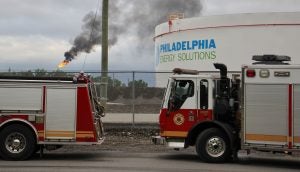High levels of cancer-causing chemical recorded at PES refinery in May, report reveals
The city knew about the high levels of benzene at the refinery, but decided not to inform the public.

A large flare burns off fuel at Philadelphia Energy Solutions refinery while firefighters battle a fire there. The wind carried the black smoke toward residential areas of South Philadelphia. (Emma lee/WHYY)
Updated 9:20 a.m. Saturday
Extremely high levels of a cancer-causing chemical were detected in a fence line air monitor at the Philadelphia Energy Solutions refinery complex last year.
According to an investigation by NBC News, E&E News, and the Investigative Reporting Workshop — a nonprofit newsroom based at American University — the levels of benzene detected in May were more than 21 times the federal limit.
James Garrow, a spokesman for the city Department of Public Health, said Thursday that the Environmental Protection Agency informed the city it had ordered PES to do a Root Cause Analysis and Corrective Action report to find the cause.
“The analysis and plan was delivered to the EPA and to the Health Department on June 24, so three days after the explosion,” Garrow said. “It basically said that the benzene numbers were high. And while PES thought they had some culpability for that — some of the benzene was from them — they assigned it also to other industries in the area and from the highways in the area.”
Garrow said the city did not disclose the information to the public because testing at a city air-monitoring station at 24th and Ritner streets did not show such high levels.
“Within the community, we never found levels of benzene high enough to indicate a threat to human health,” he said.
Former EPA officials interviewed by NBC News, E&E News and the Investigative Reporting Workshop criticized local and federal officials for failing to warn the public. According to the investigation, in the week before and after the fire, monitors registered 190 micrograms per cubic meter of benzene at various times.
Bob Sonawane, a former EPA toxicologist, is quoted in the story as saying, “Oh my god. The numbers that you’re saying are very, very high, like some things happening in China, India and many other places.”
But Garrow said even that amount is still far below what would be considered an immediate threat to human health.
Joe Minott, director of the Philadelphia Clean Air Council, said the investigation provides more evidence that high-level polluters like the refinery do not belong near where people live.
“Benzene is a very hazardous pollutant that, by law, is highly regulated in order to ensure that only very small amounts are ever emitted into the ambient air. This again suggests that the PES plant was not well-operated and maintained. As a result nearby community members and refinery workers were exposed to dangerous levels of benzene,” Minott said in an email.
The refinery complex is in the middle of a Chapter 11 bankruptcy sale process. An auction is scheduled for Friday in New York. Mark Alan Hughes, director of the University of Pennsylvania’s Kleinman Center for Energy Policy, said potential buyers of the PES refinery or investors in the land should know about the benzene problems and potential legal liability for the emission.
Hughes also chaired the environmental and science committee of the city’s Refinery Advisory Group.
—
This article was updated to clarify Mark Alan Hughes’ statement.
WHYY is your source for fact-based, in-depth journalism and information. As a nonprofit organization, we rely on financial support from readers like you. Please give today.






